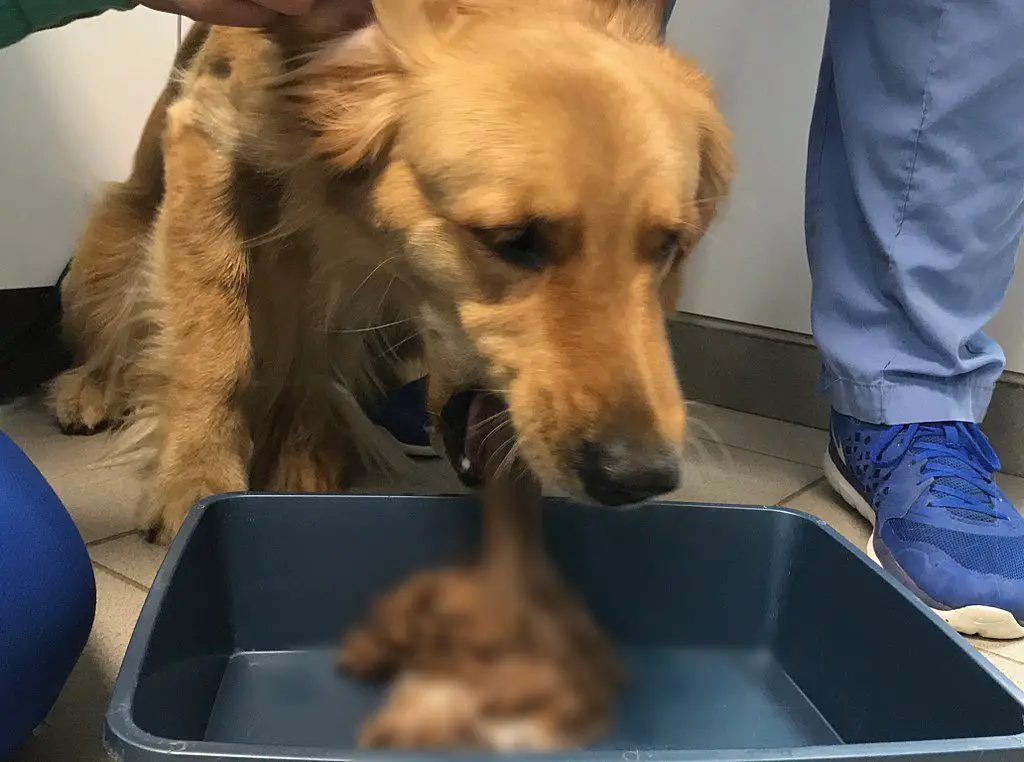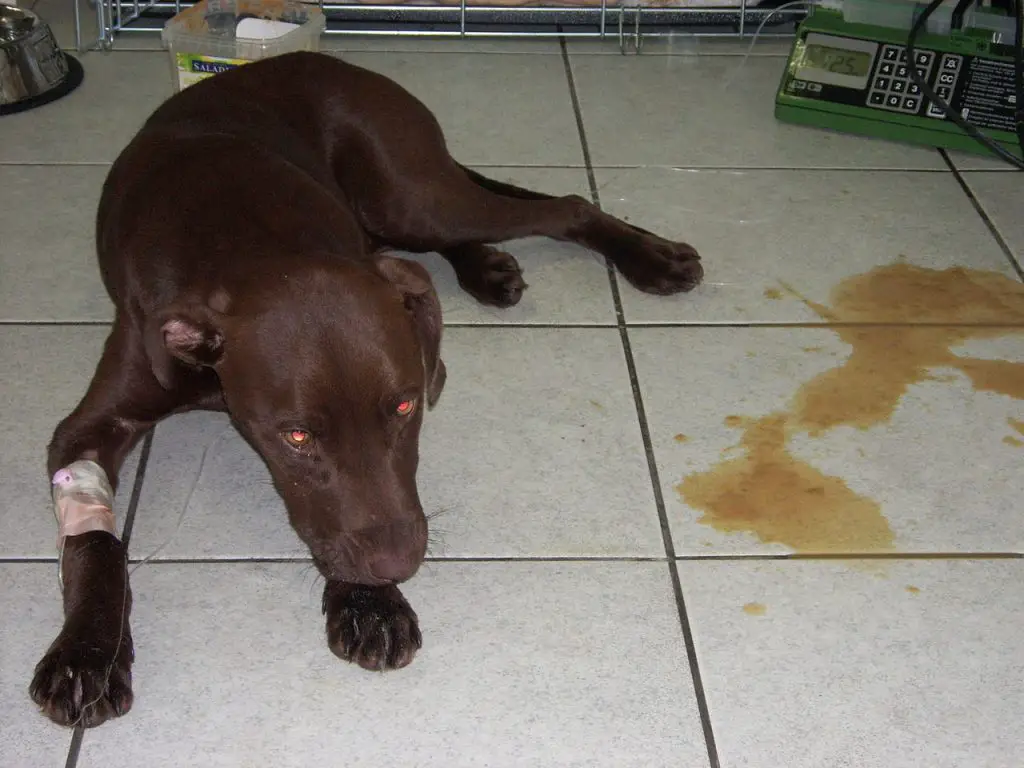If your dog is throwing up at night, it can be a cause for serious concern. There are many potential causes of nighttime vomiting in dogs; some of which are relatively minor and easily treated, while others can be life-threatening.
In this article, we will discuss the most common reasons why dogs vomit at night, and what you can do to help your furry friend feel better.
Key Takeaway
- Your dog is throwing up at night only due to acid reflux, eating too much or too quickly, and bilious vomiting syndrome which can cause nausea on an empty stomach.
- Acid reflux in dogs, also known as gastroesophageal reflux, is a condition where the dog’s stomach acid, and sometimes bile, re-enters the esophagus causing irritation and often vomiting.
- Bilious vomiting syndrome in dogs is a condition where a dog vomits bile, typically in the morning or late at night, due to an irritated stomach lining caused by excessive gastric acids from prolonged periods between meals.
Why is My Dog Throwing Up at Night Only?

Your dog might be throwing up at night only due to several possible reasons such as acid reflux, eating too much or too quickly, and bilious vomiting syndrome which can cause nausea on an empty stomach.
Acid Reflux
Just like in humans, dogs can also suffer from acid reflux. This condition occurs when stomach acid or bile flows back into the food pipe and irritates the lining.
When your dog sleeps, this acid may flow back causing discomfort and potentially leading to vomiting. Feeding your dog a few hours before sleep and elevating their bed are some ways to mitigate this issue.
Eating Too Much or Too Quickly
If your dog consumes their food too quickly or eats too much, it can lead to vomiting. This is because overeating or fast eating can put a lot of strain on the digestive system, causing it to react by expelling the excess food.
Slowing down your dog’s eating pace and reducing their portion size could help alleviate this problem.
Bilious Vomiting Syndrome
Bilious vomiting syndrome in dogs is a condition that occurs when bile leaks into the stomach from the small intestine. This typically happens when the dog’s stomach is empty for too long. The bile irritates the stomach and may cause the dog to vomit.
The most common time this occurs is first thing in the morning or in the middle of the night. Feeding your dog a small snack before bedtime can help to prevent this.
What is Acid Reflux in Dogs?

Acid reflux is a condition in which the stomach contents flow back up into the esophagus, causing heartburn, throwing up at night, and other symptoms. Acid reflux is also known as gastroesophageal reflux disease (GERD).
There are many possible causes of acid reflux in dogs. But, the most common one is a malfunctioning lower esophageal sphincter (LES). The LES is a muscle that keeps the stomach contents from flowing back up into the esophagus. If this muscle does not work properly, acid reflux can occur.
Symptoms of acid reflux in dogs may include:
- Throwing up at night
- Heartburn
- Coughing
- Wheezing
- Difficulty swallowing
If your dog is displaying any of these symptoms, it is important to take them to the vet for a diagnosis. Acid reflux can be a serious condition and may require treatment. Treatment options for acid reflux in dogs may include:
- Diet changes
- Weight loss
- Surgery (to correct a damaged LES)
- Medications (to reduce stomach acid production)
If you think your dog may have acid reflux, it is important to talk to your vet. They can properly diagnose and treat the condition. Left untreated, acid reflux can lead to more serious problems such as esophageal damage or even cancer of the esophagus.
What Is Bilious Vomiting Syndrome In Dogs
Bilious vomiting syndrome in dogs is a condition where a dog vomits bile, usually in the morning or late at night, due to an empty stomach or prolonged periods between meals.
This condition typically occurs when a dog’s stomach is empty for too long and gastric acids build up, irritating the stomach lining and causing the dog to vomit.
The vomit is often yellow or greenish in color, which is the color of bile, a digestive fluid produced in the liver.
While not typically a serious or life-threatening condition, bilious vomiting syndrome can be uncomfortable for your dog and may indicate a need for dietary adjustments.
The exact cause is not known, but it’s often associated with the timing and frequency of meals. It’s more common in dogs that are only fed once per day, particularly if they eat their meal in the evening.
Signs Your Dog Is Throwing Up Due To Acid Reflux
- Frequent vomiting, often of a yellowish bile
- Loss of appetite or decreased interest in food
- Weight loss due to reduced food intake
- Difficulty swallowing, demonstrated by coughing or choking during meals
- Excessive salivation or drooling
- Evidence of pain or discomfort, such as restlessness, whining, or reluctance to lie down
- Bad breath or a noticeable sour smell from the mouth
- Behavioral changes like hiding, lethargy, or decreased activity level.
Signs Your Dog Is Throwing Up Due To Bilious Vomiting Syndrome
- Chronic or intermittent vomiting, especially early in the morning or late at night
- Vomit is typically yellowish and may contain foam or mucus
- The vomiting often occurs when the dog’s stomach is empty
- Normal appetite and weight maintenance despite the vomiting
- No other signs of systemic illness, like fever, diarrhea, or lethargy
- The vomiting episodes may be relieved by feeding the dog small meals throughout the day.
Why Does My Dog Throw Up Yellow in The Middle of The Night?

If your dog throws up yellow in the middle of the night, it can be a sign of jaundice, which occurs when the body starts to break down red blood cells.
This can be caused by liver disease, but it can also be a side effect of certain medications. If your dog is on any medication, you should check with your vet to see if jaundice is a possible side effect. If your dog is vomiting yellow and seems to be in pain, you should also take them to the vet right away.
Jaundice is a common condition in dogs and can be caused by a number of different things. The most common cause of jaundice in dogs is liver disease. But, conditions such as cancer, infection, or blood disorders can also cause jaundice.
Jaundice can be serious in dogs if left untreated. Jaundice is caused by a build-up of bilirubin in the blood, which can be toxic to the dog’s organs.
If your dog is vomiting yellow liquid in the middle of the night, there are a few things you can do at home to help them feel better. Make sure they have plenty of water to drink to avoid dehydration. You can also try giving them small amounts of plain white rice or boiled chicken breast.
If they continue to vomit, or if they start showing other signs of illness, like diarrhea or lethargy, then you should take them to the vet immediately. With proper treatment, most dogs will recover quickly from yellow vomit.
How Do You Stop a Dog From Throwing Up Yellow?
Stopping a dog from throwing up yellow, which is often bile, involves addressing the underlying cause, such as feeding them more frequently, changing their diet, or seeking veterinary care.
Feed Them More Frequently
One common reason dogs vomit yellow bile is because their stomachs are too empty.
By feeding your dog smaller meals more frequently throughout the day, you can help prevent their stomach from becoming too empty and reduce the likelihood of them vomiting bile.
Change Their Diet
Sometimes, a dog’s diet may be the cause of them vomiting yellow bile. Foods that are high in fat, for example, can cause inflammation in the pancreas, which can lead to vomiting.
Consider switching your dog to a diet that’s easier on their stomach. This could mean food that’s lower in fat, higher in fiber, or simply a different brand of dog food.
Seek Veterinary Care
If your dog continues to vomit yellow bile despite your best efforts, it’s important to seek veterinary care.
Persistent vomiting can be a sign of a more serious underlying condition, like pancreatitis or a gastrointestinal obstruction.
A veterinarian can perform tests to determine the cause of your dog’s vomiting and recommend appropriate treatment.
FAQs
Q: Can dogs eat too much and throw up?
A: Yes, dogs can eat too much and experience vomiting as a result. Overeating can put a strain on the digestive system, leading to indigestion and vomiting. It is important to monitor your dog’s portion sizes and feeding schedule to prevent overeating. If your dog regularly vomits after eating large amounts of food, it is recommended to consult with a veterinarian to rule out underlying health issues.
Q: What is Bilious Vomiting Syndrome in dogs?
A: Bilious Vomiting Syndrome is a condition in which a dog vomits bile on an empty stomach, typically in the early morning or late at night. Bile is a digestive fluid produced by the liver and stored in the gallbladder. When a dog’s stomach is empty for an extended period, the bile can irritate the stomach lining, causing vomiting. Bilious Vomiting Syndrome is more common in dogs that have irregular feeding schedules or go long periods without eating. If your dog is experiencing frequent episodes of vomiting bile, it is advisable to seek veterinary advice for proper diagnosis and management.
Q: How can I prevent my dog from throwing up at night?
A: To prevent your dog from throwing up at night, you can try the following measures:
1. Ensure your dog’s last meal is a few hours before bedtime to allow proper digestion.
2. Divide your dog’s daily food portions into smaller, more frequent meals throughout the day.
3. Avoid feeding your dog fatty or spicy foods that can cause stomach irritation.
4. Limit your dog’s access to trash cans or any other potential sources of indigestible substances.
5. If your dog has a tendency to eat too quickly, consider using a slow feeder bowl to promote slower eating.
6. Keep your dog’s environment calm and stress-free, as anxiety can contribute to digestive issues.
7. Consult with a veterinarian to rule out any underlying medical conditions that may be causing the vomiting.
Q: Should I be concerned if my dog is only throwing up at night?
A: While isolated incidents of vomiting at night may not be cause for immediate concern, persistent or frequent night-time vomiting should be evaluated by a veterinarian. It could be a sign of an underlying health issue, such as acid reflux, gastritis, or an obstruction in the gastrointestinal tract. If your dog is showing other symptoms, such as loss of appetite, diarrhea, or lethargy, it is recommended to seek veterinary advice as soon as possible.
Q: Can stress cause my dog to throw up at night?
A: Yes, stress can potentially contribute to a dog throwing up at night. Just like in humans, stress can have negative effects on a dog’s digestive system, leading to indigestion, nausea, and vomiting. If you suspect that stress may be a contributing factor to your dog’s night-time vomiting, it is beneficial to create a calm and secure environment for your pet. Additionally, consult with a veterinarian for guidance on managing your dog’s stress levels.
Q: What other symptoms should I watch for if my dog is throwing up at night?
A: In addition to night-time vomiting, there are several other symptoms you should watch for in your dog. These may include:
– Diarrhea
– Loss of appetite
– Lethargy
– Abdominal pain or discomfort
– Excessive drooling
– Changes in behavior or mood
If your dog is experiencing any of these symptoms in conjunction with night-time vomiting, it is recommended to seek veterinary assistance for a proper diagnosis and treatment.
Q: Can certain foods cause my dog to throw up at night?
A: Yes, certain foods can contribute to a dog throwing up at night. Dogs have different sensitivities and allergies to various foods, just like humans. Some common food triggers that may cause night-time vomiting in dogs include fatty foods, spicy foods, dairy products, and certain types of grains. It is important to monitor your dog’s diet and observe any adverse reactions or digestive disturbances. If you suspect that a particular food is causing your dog to vomit at night, it is advisable to consult with a veterinarian for guidance on dietary adjustments.
Q: Should I induce vomiting in my dog if they have thrown up at night?
A: Unless instructed by a veterinarian, it is generally not recommended to induce vomiting in a dog that has already thrown up. Vomiting can often be the body’s natural way of expelling something harmful or irritating from the stomach. If your dog continues to vomit or shows signs of distress, it is best to seek immediate veterinary attention for proper evaluation and treatment.
Q: Is it normal for puppies to throw up at night?
A: It is not uncommon for puppies to experience occasional episodes of vomiting, including at night. Puppies have developing immune systems and may be more susceptible to digestive upsets. However, prolonged or frequent vomiting in puppies should not be ignored, as it could indicate underlying health issues or dietary problems. If your puppy is consistently throwing up at night, it is advised to consult with a veterinarian for appropriate guidance and care.
Conclusion and final thoughts
After diving into the topic of why dogs may throw up at night, we can conclude that there are a multitude of reasons for this behavior.
From diet and eating habits to underlying medical conditions, it’s important for dog owners to closely observe their pet’s behavior and seek professional advice if necessary.




